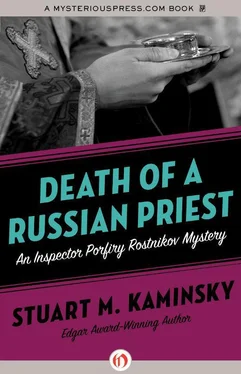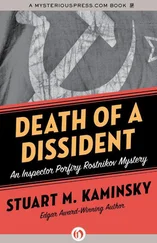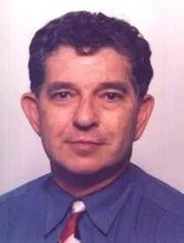Stuart Kaminsky - Death Of A Russian Priest
Здесь есть возможность читать онлайн «Stuart Kaminsky - Death Of A Russian Priest» весь текст электронной книги совершенно бесплатно (целиком полную версию без сокращений). В некоторых случаях можно слушать аудио, скачать через торрент в формате fb2 и присутствует краткое содержание. Год выпуска: 2012, Жанр: Полицейский детектив, на английском языке. Описание произведения, (предисловие) а так же отзывы посетителей доступны на портале библиотеки ЛибКат.
- Название:Death Of A Russian Priest
- Автор:
- Жанр:
- Год:2012
- ISBN:нет данных
- Рейтинг книги:3 / 5. Голосов: 1
-
Избранное:Добавить в избранное
- Отзывы:
-
Ваша оценка:
- 60
- 1
- 2
- 3
- 4
- 5
Death Of A Russian Priest: краткое содержание, описание и аннотация
Предлагаем к чтению аннотацию, описание, краткое содержание или предисловие (зависит от того, что написал сам автор книги «Death Of A Russian Priest»). Если вы не нашли необходимую информацию о книге — напишите в комментариях, мы постараемся отыскать её.
Death Of A Russian Priest — читать онлайн бесплатно полную книгу (весь текст) целиком
Ниже представлен текст книги, разбитый по страницам. Система сохранения места последней прочитанной страницы, позволяет с удобством читать онлайн бесплатно книгу «Death Of A Russian Priest», без необходимости каждый раз заново искать на чём Вы остановились. Поставьте закладку, и сможете в любой момент перейти на страницу, на которой закончили чтение.
Интервал:
Закладка:
“You knew. And if the policeman with the bad leg asked you, you would tell him.”
“No,” said Peotor.
“Yes, you would. You know it. I know it. You would tell him.”
The list of those who would have to die was growing longer, but there was no choice. If he stopped killing now, Sister Nina would have died for nothing. At least her death meant the keeping of the secret.
“So”-Peotor sighed, looking around the room-“I must run.”
“No,” said the man. His voice wavered. “You must die.”
Leonid Dovnik sat in the straight-backed chair waiting to die.
He had no doubt about what awaited him. His hands were tied painfully behind him. Of course, given the opportunity, he would try to escape, though these Arabs were clearly skilled in this sort of thing and would allow him very little room to act. Even if he were given no opportunity, he would at least try. To passively let them kill him was beneath his dignity.
The room was small. He had half expected that they would take him to the Syrian embassy, and half hoped that there would be some kind of offer made. They had traveled no more than twenty minutes in silence when Leonid reached the conclusion that he was to be killed.
Before they did this, however, they wanted something from him. He knew this was so simply because he was still alive. He was not foolish enough to think that he could negotiate for the information, whatever it was, but it was keeping him alive for now.
He looked around the room. It had a single floor-to-ceiling window. If he judged correctly from the view of the house across the street, they were at least one flight up, perhaps two. The room was furnished with four straight-backed wooden chairs, including the one in which he was trussed. A wooden table, once firm and solid, was now shaky on at least one of its three curved legs. A single lamp with a yellow shade stood in the corner. Nothing on the walls. No rug on the concrete floor. He had been sitting alone in this room for at least an hour before the door opened and a dark, well-dressed man stepped in.
“Leonid Dovnik,” the man said. This did not surprise Leonid, since they had taken his wallet.
“Yes,” he said. “And you?”
“My name is Durahaman. I am the oil emissary from the government of Syria. What does that tell you?”
“That you are the father of Amira Durahaman and that you intend to kill me,” said Dovnik.
“I do not deny either statement,” said the man. “But there are many ways to kill. There are artists and butchers. You are a butcher. I have men who are artists and will gladly give you a lesson you will never be able to use.”
Leonid tried to move his hands, which were tied behind him. The circulation was almost gone in his fingers. They had little feeling besides a gentle electric tingle. “What do you want from me?”
“You killed Zalinsky,” the man said.
Dovnik did not answer.
“You may speak,” said the man. “It really doesn’t matter if this is recorded or not as far as you are concerned.”
“I killed him,” Leonid admitted.
“For money?”
“For money,” Leonid agreed. “I am a professional. I don’t kill for fun. I am not some sick terrorist or gang member.”
“Admirable,” said the man, standing over him. “The woman who paid you is named Tatyana. She ran the Nikolai Café.”
“Ran?” asked Leonid.
“She is missing,” said Durahaman. “I think she will not be found. Do you understand?”
“Yes,” said Leonid.
“There was an accident,” said the man. “She joined the missing before she could tell us. You like trees? The sight of a new automobile? The feel of a woman?”
“What difference does it make?”
“None,” said the man. “I’ll make a bargain. You get two more days of life, an evening with a woman, if you sign a confession that you and you alone are responsible for the murders of Zalinsky and Tatyana.”
“I do not care for women. Or for men.”
“Then one last question. Were you also paid to kill my daughter?”
“No,” said Leonid. “Though it made no difference to me.”
“You do not value your life, Russian.”
“Not much,” Leonid agreed. “It is dangerous in my business to value anyone’s life.”
“It is even more dangerous not to,” said the man. “One more chance.” He stepped closer to Leonid. “Will you sign a confession?”
“Why do you want me to sign a confession? What difference does it make to you?”
“I think you know,” said Durahaman.
“I do not know,” said Leonid.
“Then what difference does it make to you whether you sign or not? You are a fool.”
“All right. I will sign if you give me time to write a letter to my mother, but first I have something I must tell you,” said Dovnik.
The oil minister leaned over and Dovnik whispered so softly that his voice could not be heard. The oil minister leaned even closer and then he discovered why Leonid Dovnik wanted to make him lean very close.
Leonid brought his head up suddenly, smashing it into the Syrian’s face. Durahaman staggered back, grabbed his chin, and toppled over a chair. Leonid half stood, still attached to the chair, and shuffled forward as quickly as he could toward the window. Durahaman, utterly dazed, tried to rise.
“Who is the fool?” Leonid shouted. He heard a shuffling of feet outside the door and flung himself, eyes closed, through the window. Shards of glass and splinters of wood dug into him. Cold, cold air slapped his face. As he tumbled forward he opened his eyes to watch the street rush toward him.
The fall couldn’t have been more than twenty feet, but it was vivid and complete. He was aware, as he fell, that there were people moving nearby. He tried to turn as he fell, and then he hit. The chair’s rear legs struck first, snapping and playing a two-beat as they clattered away to the accompaniment of Leonid Dovnik rolling on his side and striking his shoulder against the pavement. Something inside him cracked loudly and his head hit the ground with a melonlike thud.
He was not dead. Of that he was sure. He did not even feel badly injured, though he tasted blood on his lips and felt the electricity in his shoulder and the numbness of his fingers behind his back.
Someone helped him up, kicked the broken pieces of chair out from under him.
“He’s alive,” said a woman.
“He looks worse than I do,” said a man.
Leonid tried to focus.
“Let’s move him,” the man continued. Leonid recognized the voice. “I know you,” he said.
“The Nikolai Café,” said Elena. “Last night.”
“Tatyana’s dead,” said Leonid, gagging on his own blood. “The Arabs killed her.”
“You’ll be dead, too, if we don’t get you to the hospital,” said Sasha. “Let’s get out of-”
The door to the embassy flew open. Four men came out and hurried toward the two policemen and Leonid Dovnik, who leaned against Elena Timofeyeva.
“He fell,” said one of the men, the tallest of the group.
“We saw,” said Elena.
“We will help him back in,” said the tall man.
“I don’t think he wants to go back in,” said Sasha.
“No,” said Dovnik. His shoulder was broken, and he almost passed out.
“You are on Syrian territory,” said the tall Arab.
“I don’t think so,” said Elena. “The building is Syrian. The ground before it is not. Besides, this man is a Russian citizen.”
“He comes back in,” said the tall Syrian.
From beneath his jacket Sasha Tkach removed a definitely nonregulation Mauser C-96 and aimed it at the four men who were advancing toward him.
“Stop,” came a voice from above, and the four Arabs halted.
Sasha and Elena looked up. Durahaman stood in the broken second-story window, a thin trickle of blood in the right corner of his mouth.
Читать дальшеИнтервал:
Закладка:
Похожие книги на «Death Of A Russian Priest»
Представляем Вашему вниманию похожие книги на «Death Of A Russian Priest» списком для выбора. Мы отобрали схожую по названию и смыслу литературу в надежде предоставить читателям больше вариантов отыскать новые, интересные, ещё непрочитанные произведения.
Обсуждение, отзывы о книге «Death Of A Russian Priest» и просто собственные мнения читателей. Оставьте ваши комментарии, напишите, что Вы думаете о произведении, его смысле или главных героях. Укажите что конкретно понравилось, а что нет, и почему Вы так считаете.












